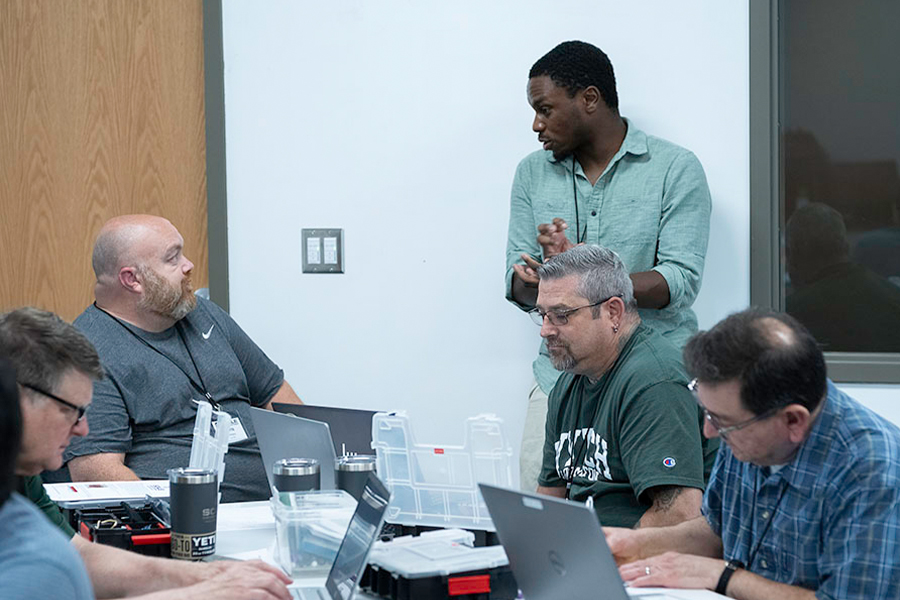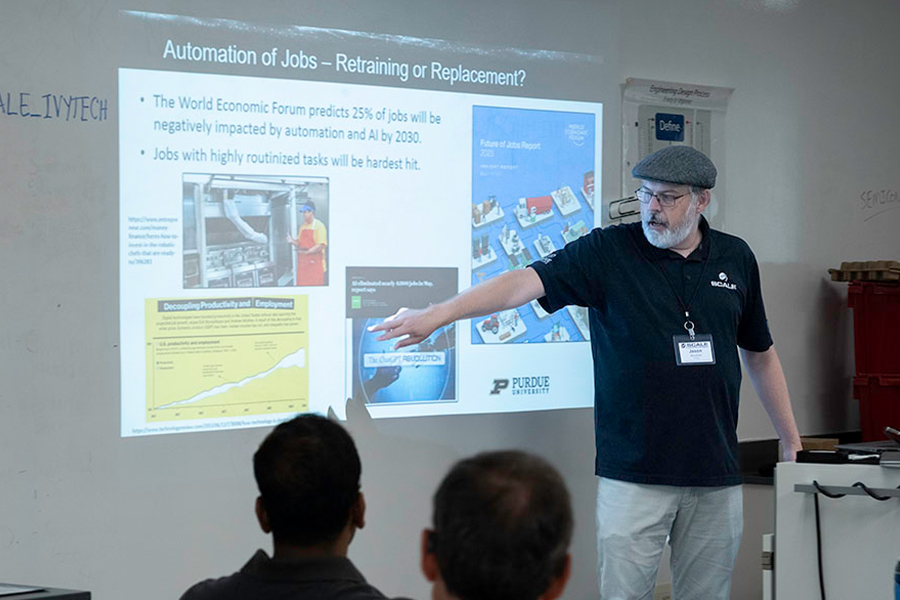Purdue, Ivy Tech microelectronics workshop aims to build curriculum for students at all levels

Preparing the next-generation workforce to bring the United States back to prominence in global microelectronics research and manufacturing was the focus of a workshop held in June that brought together faculty from Purdue and 17 additional faculty from seven Ivy Tech locations. The field of microelectronics is expected to add nearly 115,000 jobs by 2030, according to the Semiconductor Industry Association.
The Scalable Asymmetric Lifecycle Engagement (SCALE) also partners with the Applied Research Institute’s Silicon Crossroads Microelectronics Commons Hub (ARI/SCMC), who provided funding for the workshop.
To achieve the goals of the CHIPS and Science Act, Bermel said, “we need a deep pool of talented, motivated, and well-prepared individuals who can do the work at the highest standards. The partnership with Ivy Tech is a big step toward achieving this goal.”
Purdue and Ivy Tech are collaborating in several areas related to semiconductors and microelectronics, including curriculum development, outreach in high schools to increase interest in microelectronics for prospective students, and finding ways to expand the potential workforce by creating access to online courses and deploying virtual training tools.
Jason Morphew, assistant professor in Purdue’s School of Engineering Education and SCALE’s director of undergraduate curriculum and advanced learning technologies, sees this as a way to work with instructors who have technical expertise but may not be sure how to integrate the curriculum in a way that is inviting for everyone.

“Typically, what we see in traditional teaching is you have to get prerequisites done before you’re able to deal with the technology,” he said. “What we are trying to do is teach the instructors to use the hands-on stuff to teach some of the fundamentals.”
Morphew said courses at every skill level are important. “We need engineers, technicians and factory workers that have been trained to produce microchips, AI technologies and all the hardware and infrastructure to generate these capabilities. Technology is ubiquitous. It’s in every component that you buy.”
He said a goal is to create careers that are not only rewarding but long lasting, something that's not going to be easily replaced with automation.
“We are working with Ivy Tech on developing technicians, the people who are going to go in and actually build the microchips, infrastructure and AI hardware.”
Vearl Turnpaugh, assistant vice president of curriculum at Ivy Tech, is grateful for Purdue’s partnership and excited to take another step forward in the path to preparing a skilled semiconductor workforce. He said Ivy Tech will offer a certificate program in semiconductor fabrication at the Bloomington, Lafayette and Fort Wayne campuses this year, enabling the college to create a dedicated pathway for students to become highly skilled semiconductor technicians.
“The faculty gained hands-on experience with diagramming, coding and assembling microelectronics – learning that can now be used in our course instruction with faculty applying the problem-based approaches learned within the course as a method to verify learning outcomes around microelectronics,” Turnpaugh said.
Tamara Moore, professor in the School of Engineering Education and SCALE curriculum director, said this is the first workshop directly with the Ivy Tech faculty to start building curriculum for their students.
“This is a 100% partnership where their faculties learn from us, and we learn from them to understand the entire ecosystem,” Moore said. “We’re trying to build a model that we could potentially share in hypersonics and AI, among other areas that are needed in the U.S.”
Bringing back microelectronics manufacturing to the U.S. is important for a number of reasons, Moore said, perhaps most important for national security. “We want microelectronics to be trusted and reliable with the end goal of developing the workforce to create a safe, sustainable microelectronics and microchip manufacturing ecosystem that is actually starting in K-12.”
The focus with Ivy Tech and other community colleges is to build up the technical sides in these new industries like manufacturing and troubleshooting the machinery.
Source: Purdue, Ivy Tech microelectronics workshop aims to build curriculum for students at all levels
